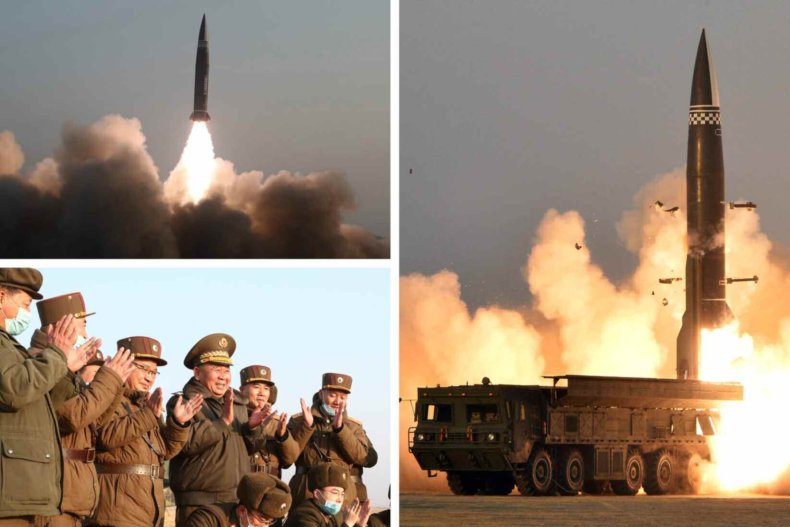North Korea Shows Off New Missile Pictures After Biden's First Press Conference
North Korea has published pictures of a new missile platform just hours after U.S. President Joe Biden addressed the country's recent launches at his first press conference.
Official Korean Workers' Party newspaper Rodong Sinmun published the image Thursday alongside a description of what it called a "newly-developed new-type tactical guided projectile" tested a day earlier in a launch overseen by ruling Korean Workers' Party Central Committee Secretary Ri Pyong Chol and other officials.
The weapon's warhead was said to have been "improved to be 2.5 tons with the use of the core technology of tactical guided projectile that was already developed."
The weapon managed to hit a target some 600 kilometers, or about 373 miles, off the east coast of the Korean Peninsula.
"The development of this weapon system is of great significance in bolstering up the military power of the country and deterring all sorts of military threats," Ri was quoted as saying.
Earlier Thursday, Biden commented on North Korea's recent launch, calling it a violation of United Security Council resolutions banning such ballistic missile activity in the nuclear-armed nation.
The president said the U.S. was in consultation with allies and partners, and, if North Korea should "choose to escalate, we will respond accordingly."
At the same time, he said he was open to a different path.
"I'm also prepared for some form of diplomacy," Biden added, "but it has to be conditioned upon the end result of denuclearization."

U.S. Indo-Pacific Command acknowledged the latest North Korea missile launch hours after the event, which occurred on the eve of Biden's debut press conference.
"We are aware of North Korean missile launches this morning into the East Sea," INDOPACOM Public Affairs Officer Navy Captain Mike Kafka said in a statement to Newsweek late Wednesday.
Kafka echoed the administration's emphasis on Washington's alliances with Seoul and Tokyo as Pyongyang exhibited its ballistic missile prowess for the first time in about a year.
"We will continue to monitor the situation and are consulting closely with our allies and partners," Kafka added. "This activity highlights the threat that North Korea's illicit weapons program poses to its neighbors and the international community. The U.S. commitment to the defense of the Republic of Korea and Japan remains ironclad."
The South Korean Ministry of National Defense also issued news of the launch and provided Newsweek on Wednesday with data that conflicted with the official North Korean account.
Seoul estimated that the launch, believed to have occurred within Hamju County, South Hamgyong province, achieved a distance of about 450 kilometers, or 280 miles, at a maximum altitude of around 60 kilometers, or 37 miles.
Japan, whose coast guard first issued the news of the launch Wednesday, denounced the act.
"The recent repeated launches of ballistic missiles by North Korea are a serious issue for the entire international community, including Japan," the ministry said in a statement shortly after the launches. "In order to protect the lives and property of the people, we will continue to do our utmost to collect and analyze information and to monitor alerts."
News broke a day earlier of a previous North Korean launch over the weekend but the weapon used was deemed to be a short-range cruise missile, a platform not banned by U.N. Security Council resolutions against Pyongyang. Biden called it "business as usual" at the time.
North Korean Supreme Leader Kim Jong Un, who did not appear to have been present during the latest missile firing, has dismissed international restrictions against his arsenal, arguing such weapons, including intercontinental ballistic missiles and nuclear warheads, were necessary to defend his country.
He doubled down on a need to expand his nation's military capabilities during the 8th Party Congress, a high-profile event held just ahead of Biden's inauguration in January. The ruler also referred to the U.S. as "the principal enemy of our state" and warned he would "adopt an adroit strategy toward the U.S. and steadily expand solidarity with the anti-imperialist, independent forces."
The rhetoric signaled one of the most telling yet of a potential shift away from negotiations pursued since 2018, when former President Donald Trump became the first sitting U.S. leader to meet a North Korean supreme leader. The two would go on to meet twice more but ultimately failed to reach an agreement that would result in North Korea's denuclearization in exchange for peace and the lifting of strict sanctions against the secretive, militarized state.
Since coming to office, the Biden administration has set out to review the policies of its predecessor, including the strategy toward North Korea. A senior U.S. administration official told reporters Tuesday they were "in the final stages of that review, and next week plan to host the national security advisors of Japan and the Republic of Korea to discuss the outcomes and other issues."
Another major stakeholder in recent events in Northeast Asia is China, whose leader, President Xi Jinping, exchanged messages with Kim on Monday via senior diplomats from both sides. Both men reiterated strengthening their decades-old alliance and Kim called for the "the need to strengthen the unity and cooperation between the two parties and two countries to cope with the hostile forces' all-round challenges and obstructive moves."
Chinese Foreign Ministry spokesperson Hua Chunying also addressed the latest launched in a press conference earlier Thursday.
"Maintaining peace and stability on the Korean Peninsula and resolving issues through dialogue and consultation serve the common interests of all relevant parties, and meet the shared aspiration of the international community," she said. "China always holds that all parties concerned need to work together to sustain the situation of detente on the Korean Peninsula, press ahead with the political settlement of the Korean Peninsula issue, and make positive efforts to achieve lasting peace and stability on the Peninsula and the region."

